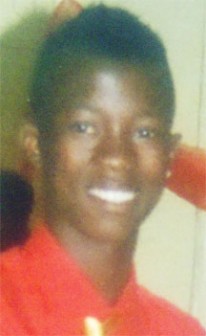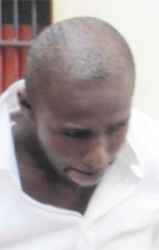A witness yesterday testified that he heard some of Shaquille Grant’s friends speaking of plans to commit a robbery on the day the teen was shot dead by police.
Travis David said too that Romel Bollers, a friend of the dead teen and who was also shot in the encounter, showed him a gun and told him that he needed money to purchase another one.
David was at the time testifying at the trial of his cousin, former police constable Terrence Wallace, who is accused of murdering Grant, at Caesar Street, Agricola, East Bank Demerara on September 11th, 2012.

According to the witness, he was at his 110 Caesar Street, Agricola home on September 11, when he saw Bollers, Troy Greenidge and Jamal Henry, who are all friends, at the back of his yard. He said when he asked the boys, whom he knew, what they were doing in his yard, they replied “we are just liming.”
David said that as he subsequently made his way out of his yard to run an errand, he was stopped by Greenidge, who wanted to pawn a gold chain to him, but he declined after realising that the jewellery was not authentic.
He added that he told Greenidge, “I can’t deal with that, because Romel is a fraud.”
He said that upon his return from the shop, Greenidge told him that he needed money to purchase “something.” David said that after enquiring what it was that he wanted to buy, he was told “another gun.”
According to the witness, it was at that point that Bollers reached to his waist from which he took out a gun. He said that Bollers spun the barrel telling him, “You never see anything like this.”

David said the weapon was a .38 revolver with six live rounds. Asked by prosecutor Narissa Leander how he knew the calibre of the weapon, the witness said that he once worked in the army and is familiar with weapons.
David, who was a minibus driver at the time, said he told the two young men that he would call his conductor and ask for the money. He said that he left them and went into his apartment to make the call but instead he called Wallace, his cousin. He said he called Wallace because he knew that the boys “were planning to go on a robbery.”
Asked by the prosecutor how he knew that, the witness said, “I know this, because they were talking about it.”
David said that after talking to Wallace, he left and went to the shop again, leaving Bollers, Greenidge and Henry. When he returned, he saw Grant and Eastman.
The witness said that he told Bollers and Greenidge that his conductor was on his way with the money, after which he again left and went out to a shop. He told the court that while at the shop, he saw police arrive in the village and two minutes after, heard loud explosions coming from the direction of his house.
He said that after the first explosion, he heard three others follow. He told the court that he then saw a police vehicle transporting someone who was lying facedown.
According to David, after hearing the explosions, he called one of his sisters, who was at home at the time, and as a result of what she told him, he left the village. He did not return until two years after.
Responding to questions from the prosecutor, David said he left the village because his car was burnt, his home was broken into and he was threatened.
Constable Shawn Critchlow, the crime scene rank who processed and photographed the scene of the killing, was scheduled to continue his evidence-in-chief yesterday. The court, however, excused his absence, after the prosecutor indicated that he was performing special duties in light of the country’s general elections, which were held on Monday.
Leander, who indicated that four remaining policemen are yet to take the stand, was granted an adjournment after explaining that they were on post-election duties as well. Trial judge Navindra Singh then adjourned the case to Friday morning at 9AM for continuation.
He explained to members of the jury that if the officers become available before Friday, they will each be contacted and told when to attend court.
When he testified last Friday, Critchlow was unable to tell the court the whereabouts of the spent shells that he said he recovered from the scene of the crime as well as samples which he said he took from swabbing the skin of Grant, Bollers, Greenidge, Henry and Eastman. As a result, he was ordered by the judge to locate the items to produce them to the court yesterday.
The prosecution’s case is that Wallace had ordered Grant and his friends to lie on the ground and while complying, Bollers began removing his cell phone from his pocket. At once, there was a bang which appeared to be a gunshot.
In her opening address, Prosecutor Judith Gildharie-Mursalin, who appears in association with Leander, said that Bollers was shot to the head, while Grant was heard saying, “officer, officer, I get shoot.” She said that what appeared to be other gunshots rang out and following the shooting Bollers was injured and Grant “was dead.”
The court had heard from Gildharie-Mursalin that according to the police’s version, Bollers was attempting to run away from them, and at the same time, had discharged a round at them from a weapon which he had.
“The officers claimed that the action by Bollers was the catalyst for their shooting,” Gildharie-Mursalin had said.
In his testimony last Thursday, however, Bollers said that contrary to what police have claimed, neither he nor any of his friends had any weapon when the police opened fire on them.




